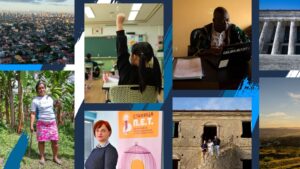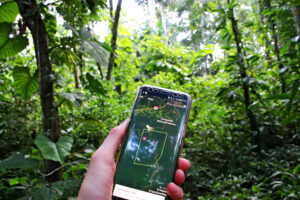Promoting Access to an Open and Free Internet
Enhancing Digital Civic Space through OGP
Open government thrives when people can freely access government information and services, share opinions and information among themselves and with their leaders, and act individually and collectively to influence decision-making and hold governments accountable—both online and offline. While the internet and digital tools can play an important role in empowering the public, more action is needed to ensure that these spaces enable robust civic action and participation.
This three-part series highlights recommendations from the International Center for Not-for Profit Law’s (ICNL) Enhancing Digital Civic Space through the OGP Process, focusing on specific policy areas: Promoting Access to an Open and Free Internet, Digital ID, and Addressing Harmful Information Online. Each blog also links to more extensive guidance documents on how governments can protect vital digital democratic infrastructure and promote the ability of individuals to exercise freedoms and contribute to open government online.
Access to an open and free internet is integral to individuals’ and organizations’ ability to exercise fundamental freedoms online, and to benefit from, and contribute to, digital open government initiatives. Achieving meaningful access requires investments that make the internet and digital platforms available to all, especially those who have been traditionally excluded from public fora and effective service provision, while lifting and avoiding the imposition of restrictions on internet access that discourage, stifle, or frustrate online participation.
Here are a few recommended actions governments can implement to empower all citizens to benefit from the internet and leverage digital tools to contribute to better and more accountable governance.
Recommended Open Government Commitments
Making the Internet and Digital Platforms Available to All
- Recognize internet access as a right and enabler of other fundamental rights, such as the rights to freedom of expressionJournalists and activists are critical intermediaries connecting public officials with citizens and serving as government watchdogs, and their rights and safety need to be protected. Technical specifi... More, peaceful assembly, and association, through a constitutional amendment or legislationCreating and passing legislation is one of the most effective ways of ensuring open government reforms have long-lasting effects on government practices. Technical specifications: Act of creating or r.... Laws and policies related to internet access should be drafted, adopted, and enforced with active public consultations, scrutiny, and oversight.
- Prioritize investments in network infrastructure to better ensure that all people—especially underserved and unconnected urban and rural communities—can equitably access and participate in decision-making. This can include setting up secure public WiFi access points and incentivizing the development of community networks. Equitable internet access also requires that policies make the internet more affordable. This can include instituting more consumer protections, rescinding existing taxes on broadband or cellular internet access, subsidizing the cost of connectivity for individuals with lower income and persons with disabilities, and prohibiting discriminatory consumer practices by internet service providers.
- Conduct a transparent review of digital platforms and tools for accessibility and aptness. Such a review should include consultations with disability rights organizations and the wider public. Governments should also make appropriate modifications to digital platforms and tools to ensure accessibility and aptness for all communities: youthRecognizing that investing in youth means investing in a better future, OGP participating governments are creating meaningful opportunities for youth to participate in government processes. Technical ... More, women and girls, migrants and refugees, minority language speakers, persons with disabilities, LGBTQIA+Increasing opportunities for participation and creating accountability mechanisms for the LGBTQIA+ community in policy-making and service delivery can ensure that their voices are heard and changes ar... persons, and others. If they do not already exist, responsible agencies should create and publish government-wide standards for accessibility and aptness for all communities and ensure that procurements of new digital tools include those standards and are made available for public review.
Removing Restrictions on Meaningful Internet Access
- Remove SIM card registration requirements that ask for an individual’s national identification to be linked to their mobile device. Such requirements can have a chilling effect on civic participation in decision-making if those who wish to express criticism of a government policy through an online platform fear that they could be tracked through their SIM. In addition to these privacy and free expression concerns, SIM card registration requirements unduly restrict internet access, as individuals lacking official identification—often due to historic exclusion—cannot obtain SIM cards and thereby use the internet, including to access digital governanceAs evolving technologies present new opportunities for governments and citizens to advance openness and accountability, OGP participating governments are working to create policies that deal with the ... More initiatives and services. Research has shown SIM card registration laws disproportionately exclude women and marginalized populations from using mobile devices.
- Repeal any legal basis to intentionally disrupt internet access that renders the internet unusable in whole or in part, whether nationwide or in specific locations. This includes, but is not limited to, blanket internet shutdowns (such as internet kill switches), internet throttling, and blocking entire social media or messaging platforms. States should conduct a thorough, transparent review of the current legal and regulatory framework relating to the disruption of telecom services. Such a review includes inviting and incorporating feedback from all stakeholders, such as civil society, telecom and internet service providers, the media, and the public at large.
- Prohibit extralegal practices of shutting down, throttling, or blocking internet services, in whole or in part, by developing guidance and regulations for ministries and law enforcement officials.
- Promote meaningful internet access through foreign policy by issuing guidance to embassies and working with like-minded governments to engage governments with practices of shutting down, throttling, or blocking internet services, in whole or in part. Governments should ensure that coercive economic sanctions include exemptions for internet and tech services that enable the public, including journalists and human rightsAn essential part of open government includes protecting the sacred freedoms and rights of all citizens, including the most vulnerable groups, and holding those who violate human rights accountable. T... defenders, to meaningfully access and use the internet.
- Mandate public disclosure of telecommunication service provider agreements that authorize the government to issue requests for data or order the restriction of access to services. Governments should issue guidance and regulations prohibiting the inclusionOGP participating governments are working to create governments that truly serve all people. Commitments in this area may address persons with disabilities, women and girls, lesbian, gay, bisexual, tr... More in such agreements of terms preventing service providers from publicly reporting information and statistics on network disruptions and takedown orders.
Positive Examples from OGP Action Plans and Beyond
- Colombia created an interactive web platform and call center to promote access by blind and deaf citizens to public information and government services.
- Costa Rica’s Supreme Court has declared that access to the internet is a fundamental right, similar to the rights to information and communication. Law No. 8660 of 2008 requires that telecommunication operators provide open access to networks and services and observe non-discrimination between public and private users. Costa Rica also has an Internet Advisory Council that facilitates multi-stakeholder and interdisciplinary cooperation from government, academia, the private sectorGovernments are working to open private sector practices as well — including through beneficial ownership transparency, open contracting, and regulating environmental standards. Technical specificat... More, and civil society in developing policy on internet governance and access.
- Lesotho has a universal access fund that aims to provide affordable and accessible telecommunications services to all citizens, particularly those living in rural and underserved areas. The fund operates by financing the expansion of mobile networks and the rollout of fiber-optic cables, which has in turn led to a significant increase in internet penetration rates. Lesotho is turning now to invest in digital skills, including amongst women and girls.
- Tanzania has established a Universal Communications Service Access Fund, which aims to support the provision of affordable and accessible communication services, including internet access, in underserved and rural areas.
- The United States has allocated US $65 billion to boost broadband deployment and adoption, with funds earmarked for broadband deployment in unserved and underserved communities, development of low-cost broadband options for eligible families, digital inclusionPrioritizing digital inclusion — such as by expanding broadband access to remote areas or removing barriers to affordable internet — helps ensure all citizens have the opportunity to participate. ... More and digital equity programs, and investment in tribal and rural areas.
Many obstacles can hinder participation in the digital commons—from limited digital skills and literacy, to unnecessary conditions and taxes imposed on digital access, to blanket shutdowns of internet services. Governments can remove such obstacles by increasing access and affordability for all people as a part of their digital governance agendas and by refraining from measures that constrain the exercise of freedoms online. These measures will help maximize the benefits of open government practices both online and off.
Download a PDF of this blog post here.
No comments yet
Related Content

Digital Governance in OGP
OGP countries are leveraging the opportunities of evolving technology, such as artificial intelligence, data-driven algorithms, and mass social networks, while also developing policies to deal with the threats, including disinformation,…
 Uncategorized
Uncategorized Six Ways to Protect Democracy against Digital Threats in a Year of Elections
2024 has been dubbed the “year of elections”, with over four billion people expected to vote across more than 60 elections. This should be a cause for democratic celebration, but…

Open Gov Guide
The Open Gov Guide is the go-to resource for officials, civil society representatives, and other actors looking for recommendations, examples, and resources on open government.


Leave a Reply